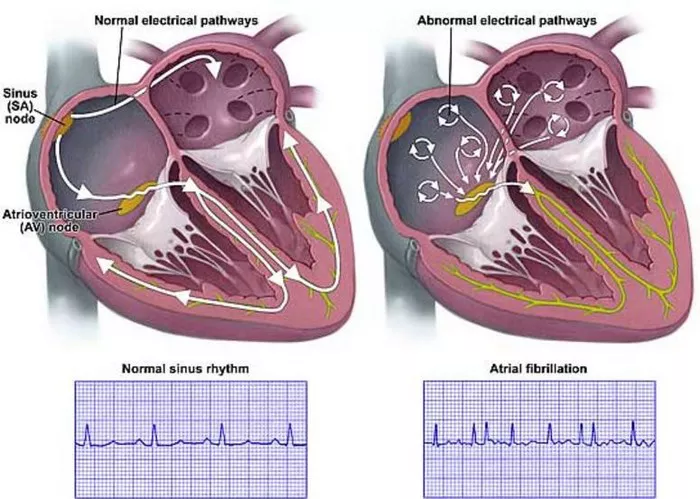Atrial fibrillation (Afib) is a common heart rhythm disorder characterized by irregular and often rapid heartbeats. It can lead to serious complications such as stroke, heart failure, and other heart-related complications if not managed properly. One of the factors that can contribute to the development or worsening of Afib is alcohol consumption. In this article, we will explore the relationship between Afib and alcohol consumption and answer the question: Will Afib go away if I stop drinking?
Understanding Atrial Fibrillation (Afib)
Before delving into the impact of alcohol on Afib, let’s first understand what Afib is and how it affects the heart. Afib occurs when the heart’s electrical signals become disorganized, causing the upper chambers of the heart (atria) to quiver or fibrillate instead of contracting normally. This irregular heartbeat can lead to poor blood flow, increasing the risk of blood clots, stroke, and other heart-related complications.
The Link Between Alcohol and Afib
Several studies have suggested a strong association between alcohol consumption and the development of Afib. Alcohol can directly affect the heart’s electrical system, leading to episodes of Afib or exacerbating existing Afib. The exact mechanism through which alcohol influences Afib is not fully understood, but it is believed to involve changes in heart rate variability, inflammation, and oxidative stress.
Effects of Alcohol on Afib
1. Increased Risk of Afib Episodes: Drinking alcohol, especially in large quantities or binge drinking, can trigger Afib episodes in individuals with a predisposition to the condition. The risk may be higher for those who have a history of Afib or other heart rhythm disorders.
2. Worsening of Afib Symptoms: For individuals already diagnosed with Afib, alcohol consumption can worsen symptoms such as palpitations, chest discomfort, fatigue, and shortness of breath. This is particularly true during and after alcohol consumption.
3. Impact on Heart Health: Excessive alcohol intake can have detrimental effects on overall heart health. It can contribute to high blood pressure, cardiomyopathy (weakening of the heart muscle), and other cardiovascular conditions, all of which can further complicate Afib management.
Can Afib Improve by Stopping Alcohol Consumption?
The question of whether Afib will go away if alcohol consumption is stopped depends on various factors, including the individual’s overall health, the severity of Afib, and other lifestyle factors. Here are some key points to consider:
1. Reduced Risk of Afib Episodes: Quitting alcohol or significantly reducing alcohol intake can lower the risk of Afib episodes. Studies have shown that abstaining from alcohol can lead to improvements in heart rhythm stability and a reduced recurrence of Afib.
2. Better Treatment Response: Individuals with Afib who stop drinking may experience better responses to medical treatments such as anti-arrhythmic medications, rate control drugs, and procedures like cardioversion or ablation.
3. Improved Heart Health: Beyond Afib management, stopping alcohol consumption can improve overall heart health, reduce the risk of other cardiovascular diseases, and enhance quality of life.
Lifestyle Changes for Afib Management
While quitting alcohol can be beneficial for Afib management, it is often recommended as part of a broader approach to lifestyle changes. Here are some additional strategies that can help manage Afib:
1. Healthy Diet: Adopting a heart-healthy diet rich in fruits, vegetables, whole grains, lean proteins, and low in saturated fats, cholesterol, and sodium can support heart health and Afib management.
2. Regular Exercise: Engaging in regular physical activity as recommended by healthcare providers can improve cardiovascular fitness, control weight, and reduce stress, all of which can benefit Afib management.
3. Stress Management: Managing stress through relaxation techniques, mindfulness, meditation, and adequate sleep can help reduce the likelihood of Afib episodes.
4. Medication Adherence: Following prescribed medications as directed by healthcare providers is essential for controlling Afib symptoms and reducing complications.
Conclusion
In conclusion, alcohol consumption can contribute to the development and worsening of Afib, and quitting or reducing alcohol intake can lead to improvements in Afib management and overall heart health. However, the effects of stopping alcohol on Afib vary among individuals, and it is important to consult healthcare providers for personalized advice and treatment plans. Adopting a healthy lifestyle, including a balanced diet, regular exercise, stress management, and medication adherence, plays a crucial role in Afib management and improving quality of life.
By making informed decisions and working closely with healthcare professionals, individuals with Afib can take proactive steps towards better heart health and a reduced risk of complications associated with the condition.


